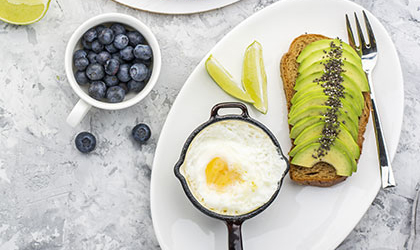
There’s a lot to think about in pregnancy – and |your nutrition//B489//target="_blank"| is one of them. You may have heard folic acid for pregnancy is particularly significant. But why? We take a look below.
What is folic acid?
Folic acid is the synthetic version of folate, a water-soluble B vitamin naturally found in food. It plays a critical role in blood formation, psychological function, immunity, energy production, and cell division.
Why is folic acid essential during pregnancy?
Folate is also vital during pregnancy, helping form the neural tube, part of a baby’s nervous system (1). Taking folic acid during pregnancy may reduce the risk of neural tube defects, which can affect an unborn baby’s brain or spine and lead to conditions like spina bifida (2).
Low maternal levels of folic acid may also cause other pregnancy complications, including miscarriage, low birth weight, and foetal growth retardation (3).
What foods are high in folic acid?
The body doesn’t store folate, so ensuring a reliable intake is essential. You can find folate in these foods:
Dark leafy green vegetables
Dried beans
Brussel sprouts
Citrus fruits
Chickpeas
Potatoes
Parsnips
Tomatoes
Bananas
Fortified foods are also a good source of folic acid:
Yeast extract
Bread and flour
Breakfast cereals
Should you take a folic acid supplement during pregnancy?
Although you can find folate in plants and folic acid in fortified products, getting enough from food alone can be challenging during pregnancy. So, if you’re pregnant or want to get pregnant, you should take supplemental folic acid to help meet your recommended daily allowance.
How much folic acid is recommended during pregnancy?
In the UK, health officials advise all women to take 400-microgram folic acid every day while trying to conceive and until the 12th week of their pregnancy (4). Since many pregnancies are unplanned, it’s a good idea to take folic acid even if you’re not trying to get pregnant. And if you weren’t taking folic acid before conception, don’t stress too much. Just start supplementing as soon as possible.
Do you need folic acid after 12 weeks?
As you enter week 12 of pregnancy, your baby’s neural tubes have sealed, so, in theory, there’s no need to continue supplementing with folic acid. However, if your pregnancy multivitamin contains folic acid, it’s perfectly safe to carry on taking it.
We recommend choosing a |prenatal health multivitamin//P482//target="_blank"| that supplies folic acid in the most bioavailable form of L-methylfolate, which the body can readily use.
Find out more
If you found this article on folic acid and pregnancy useful, you can find similar guidance on our health blog. Alternatively, please get in touch with our team of expert Nutrition Advisors, who are on hand to provide free, confidential advice.
References:
NHS (2020). Vitamins, minerals and supplements in pregnancy.nhs.uk. Available at: https://www.nhs.uk/pregnancy/keeping-well/vitamins-supplements-and-nutrition/.
US Preventive Services Task Force (2023). Folic Acid Supplementation to Prevent Neural Tube Defects: US Preventive Services Task Force Reaffirmation Recommendation Statement.JAMA. 330(5), 454–459.
Scholl, T.O. and Johnson, W.G. (2000). Folic acid: influence on the outcome of pregnancy.The American Journal of Clinical Nutrition, 71(5), 1295S–1303S.
NHS (2020). Vitamins, minerals and supplements in pregnancy.nhs.uk. Available at: https://www.nhs.uk/pregnancy/keeping-well/vitamins-supplements-and-nutrition/.
You Might Also Like

|Vegan Pregnancy: Key Vitamins for Your Baby's Development//B504|

|The Modern Breakfast: Trending Foods That Fuel Your Day//B470|

|Are Your Bones Healthy: Signs and Symptoms to Look out For//B565|

Olivia
Olivia Salter has always been an avid health nut. After graduating from the University of Bristol, she began working for a nutritional consultancy where she discovered her passion for all things wellness-related. There, she executed much of the company’s content marketing strategy and found her niche in health writing, publishing articles in Women’s Health, Mind Body Green, Thrive and Psychologies.
|View More//B460|